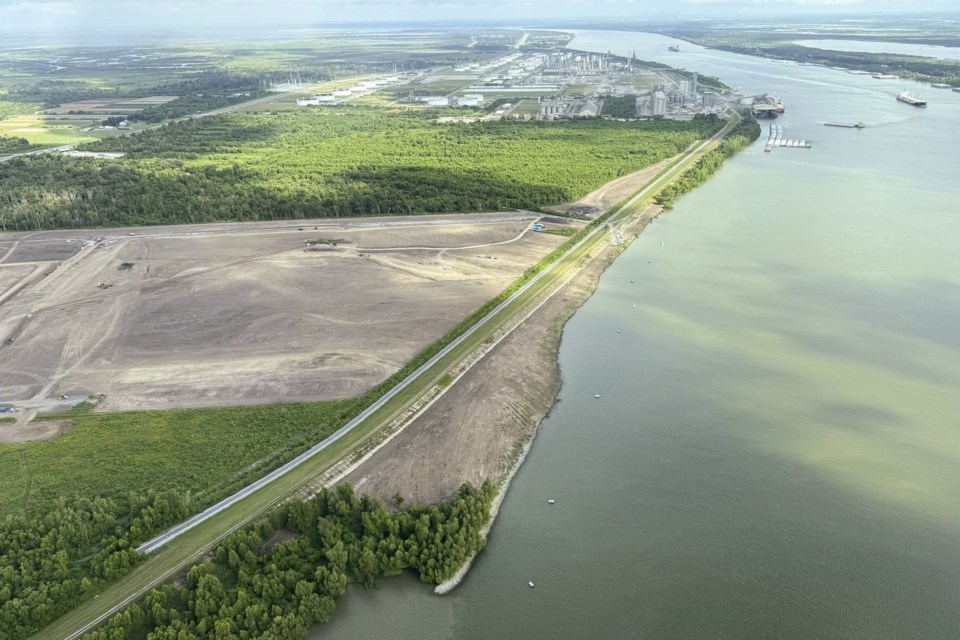NEW ORLEANS, La. (AP) — Federal officials want to know if Louisiana remains committed to a nearly $3 billion planned coastal restoration project that litigation has stalled.
Federal officials warned in a Friday letter to the head of Louisiana's Coastal Protection and Restoration Authority that they expected the state to return federal funds allocated for the project if the state decides not to move forward with it. Without providing a deadline for response, federal officials requested a “clear statement” from the state that it plans to follow through on the project as designed.
The Mid-Barataria Sediment Diversion project is Louisiana's flagship coastal restoration project in response to a rapidly vanishing coastline caused by subsidence, erosion and sea-level rise propelled by climate change. The project would channel 75,000 cubic feet (2,100 cubic meters) of sediment per second from the Mississippi River into the nearby Barataria Basin in Plaquemines Parish to create between 20 to 40 square miles (52 to 104 square kilometers) of new land over five decades.
But soon after the project broke ground in August 2023, Plaquemines Parish authorities sued the state agency overseeing the project, the CPRA, alleging a flawed permitting process as they raised concerns over the project's impact on local communities. And in January, local oyster companies and an environmental group sued federal agencies permitting the project on the grounds it will affect water quality, negatively impact commercial fisheries and harm bottlenose dolphins. The project has been largely halted as negotiations drag on.
Proponents, including environmental groups and a range of state lawmakers, are concerned the project may be significantly reduced or canceled. It would be a major blow to scientifically backed plans to respond meaningfully to coastal land loss in a state losing approximately a football field of land every 100 minutes, according to the environmental coalition group Restore the Mississippi River Delta. The coalition said it was concerned that Governor Jeff Landry's administration was “wavering” in its commitment to the project.
Spokespersons for Landry and the CPRA declined to comment.
The letter from federal officials was signed by representatives from the Environmental Protection Agency, the National Oceanic and Atmospheric Administration, the Department of the Interior, and the Department of Agriculture.
Those four agencies are trustees overseeing federal funds obtained in a settlement following the 2010 Deepwater Horizon oil spill in the Gulf Coast. Louisiana is also part of a trustee group of affected states drawing on the funds.
The CPRA reported $519.3 million has been spent on the project out of the $2.92 billion set aside for its construction, according to a presentation at an Oct. 11 state Senate hearing. This includes $378 million budgeted for mitigation and stewardship programs for impacted communities and industries.
In their letter, federal officials told Louisiana returned funds would be used for “future restoration activities” but did not specify if they would remain earmarked for projects in Louisiana.
They pointed out the Mid-Barataria project has undergone years of evaluation and included significant impact mitigation for affected groups.
“No other single restoration project has been planned and studied as extensively over the past decades,” the letter said. It noted the project would lessen the impact of storms on coastal communities and reduce flooding in surrounding areas.
The Mid-Barataria project is “the linchpin" of Louisiana's plans to protect its vanishing coastline, said Ethan Melancon, advocacy director of the Coalition to Restore Coastal Louisiana.
He said the project, mimicking natural land creation processes, would allow for a constant supply of sediment to fight against coastal erosion. He argued it would be much more effective and long-lasting than alternatives proposed by the project’s opponents, such as using dredging material to offset land loss.
Federal officials said in the letter there would be “no guarantee” of approval of alternative projects.
____
Brook is a corps member for The Associated Press/Report for America Statehouse News Initiative. Report for America is a nonprofit national service program that places journalists in local newsrooms to report on undercovered issues. Follow Brook on the social platform X: @jack_brook96
Jack Brook, The Associated Press



